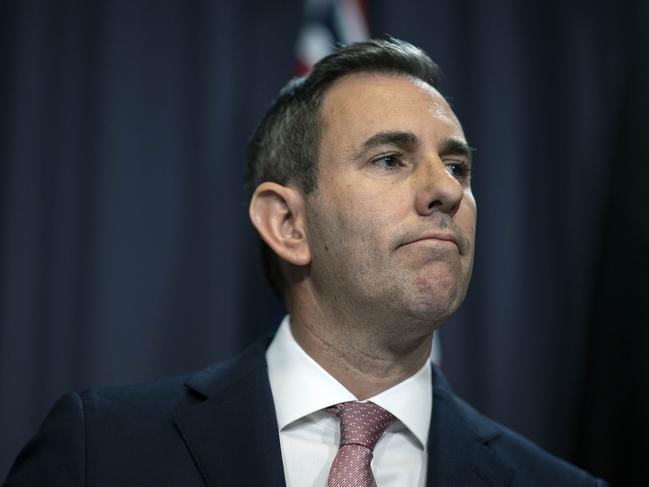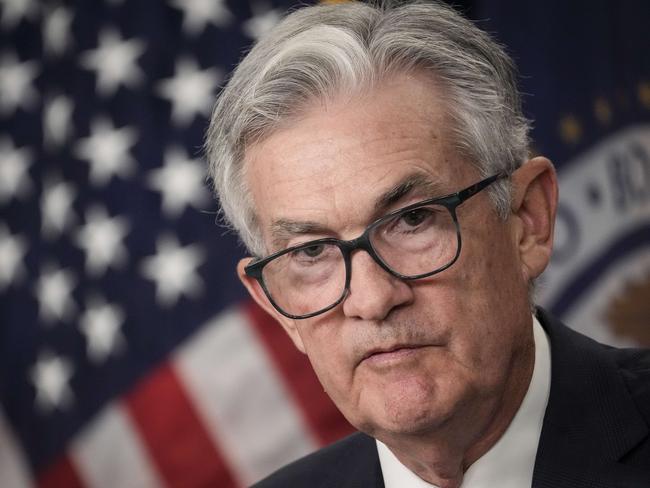Jim Chalmers’ trip to Washington DC needs to deliver a better economic outcome for Australia
With America enforcing an economic slowdown and exporting it to the world, Jim Chalmers has to figure out how to make the most of this crisis for Australia, argues Tom Minear.
Opinion
Don't miss out on the headlines from Opinion. Followed categories will be added to My News.
Jim Chalmers will only need to open his wallet in Washington DC this week to be reminded of the economic slowdown that American policymakers are enforcing in the United States – and spreading to the world.
If the Treasurer had made the trip two months ago, a $10 bill emblazoned with the face of Alexander Hamilton would have been worth $7.10 back home. Now it’s only worth $6.30, as the Australian dollar plummets perilously close to the lowest level in a decade.
That’s because the US dollar is stronger than it’s been for 20 years although, unless you’re an American travelling overseas, that’s not great news for them either. A strong US dollar provides access to cheaper imports, but as investment giant Morgan Stanley pointed out last month, it takes a toll on economic growth overall as demand for US exports is depressed.
The difficult truth is that slowing the economy is the mission of America’s Federal Reserve, as the US central bank sharply hikes interest rates to tackle skyrocketing inflation.

If Chalmers has time to drop into a supermarket or service station, he will see how essential it is that the Fed succeeds. The cost of food has soared by 11.4 per cent over the past year and petrol prices are up 25.6 per cent.
But unlike in Australia, where the Reserve Bank is also jacking up rates, the Fed’s actions have the inevitable by-product of exporting America’s inflation problem to the world.
Lifting rates boosts the US dollar by making it more appealing to investors. In turn, the strengthening dollar increases the price of key global commodities such as energy and food that are set in American money, meaning other countries are hit with higher costs.
More broadly, by deliberately slowing the US economy to combat inflation, the Fed is increasing the chances of a global recession. America sneezes and the world catches a cold, or so the saying goes, and that’s the last thing we need during a pandemic.
This is why Chalmers is visiting DC a fortnight out from delivering his first federal budget.
Since taking on the Treasury portfolio, he has weaved an honest if depressing tale about the state of the economy, repeatedly reminding Australians of three challenges for which Labor is claiming no responsibility: the deteriorating global situation, high and rising inflation and interest rates, and the increasing cost of health, aged care, the NDIS, defence and debt.
In contrast to the often unrealistic optimism of his predecessors, Chalmers is deliberately telling a scary story to justify any difficult decisions he believes he needs to make. His DC trip will provide enough material for a few more chapters.
The Treasurer will meet with Fed chair Jerome Powell, who recently acknowledged his planned “soft landing” – slowing growth enough to curb inflation but not so much as to cause a recession – was looking increasingly unlikely.

Chalmers will also join the annual meeting of the International Monetary Fund, which will on Wednesday predict “the worst is yet to come” for the global economy and that “for many people, 2023 will feel like a recession”.
The narrative that the Treasurer has been honing ahead of the budget suggests he subscribes to Winston Churchill’s adage of never letting a crisis go to waste. The unanswered question is what Chalmers plans to do with this moment.
Last week, he sent out smoke signals about the viability of the stage three tax cuts, a legislated package creating a 30 per cent tax rate for everyone earning between $45,000 and $200,000 from the middle of 2024.
While Anthony Albanese has since hosed this down, maintaining Labor’s election promise, Chalmers was always uneasy about the bulk of the benefits flowing to high-income earners and will have two more budgets to make changes before the cuts kick in.
The Treasurer is right to want to rebuild our fiscal buffers, which is the first priority for policymakers identified by the IMF. But the overwhelming focus in this debate so far on the stage three cuts feels simplistic and a bit lazy, particularly given Australia is far more reliant on personal income tax revenue than comparable countries.
If Chalmers is true to his word and wants to make decisions that are responsible, not just politically expedient, then he will inevitably have to go beyond Labor’s election platform, limited as it was on structural savings and revenue-raising measures.
There are plenty of other options – reining in superannuation tax concessions, broadening the GST, introducing a new super-profits tax – which would all represent broken promises.
Then again, if Chalmers really wants to make the most of this crisis, then maybe he would be better off revamping our tax system in a way that didn’t leave ordinary Australians finding less money in their wallets – and not just when they go to the US.
More Coverage
Originally published as Jim Chalmers’ trip to Washington DC needs to deliver a better economic outcome for Australia





